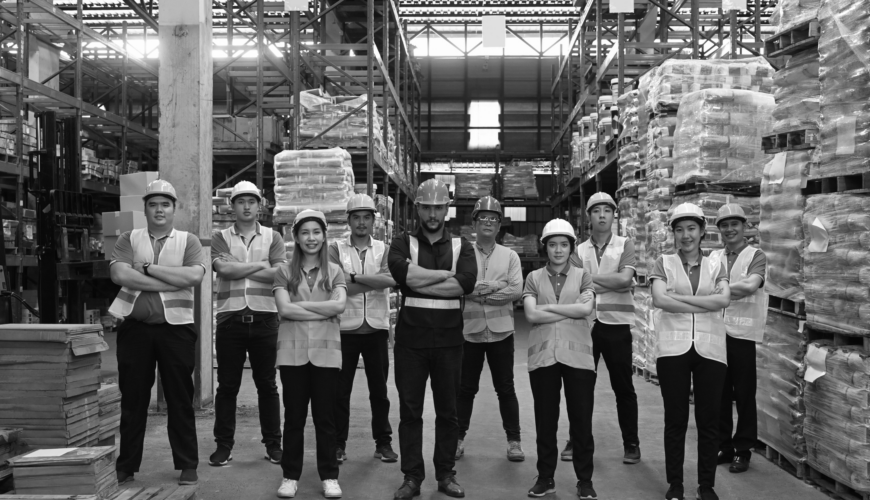Supply chain direct labor employees are the backbone of the supply chain. Investing in personnel is crucial to operational success. Effectively hiring, training, coaching, and mentoring supply chain direct labor employees is crucial for maintaining a productive and efficient workforce. Here’s a detailed guide on each of these key aspects:
Recruitment and Selection
Identifying and hiring the right talent is crucial. This involves creating detailed job descriptions, posting openings on relevant platforms, and conducting thorough interviews to assess candidates’ skills, experience, and cultural fit. Hiring the right people ensures that the workforce has the necessary skills and attitude to perform their roles effectively, leading to increased productivity and reduced turnover.
Onboarding and Orientation
Once hired, new direct labor employees must be properly introduced to the organization, its culture, policies, and procedures. This includes familiarizing them with safety protocols, equipment operation, and the facility’s layout. Effective onboarding is not just about knowledge transfer; it’s about making our new team members feel valued and integrated. It sets the tone for them, helping them feel welcome and part of the team. It also ensures they have the knowledge and resources to perform their job safely and efficiently, minimizing errors and accidents.
Training Programs
Implementing structured training programs tailored to the specific roles within the supply chain operations is essential. This can include classroom training, hands-on simulations, and shadowing experienced employees. Proper training equips employees with the skills and knowledge to perform their tasks accurately and efficiently. It reduces the learning curve, improves job satisfaction, and ultimately boosts productivity by ensuring employees are confident in their abilities.
Continuous Learning and Development
Investing in ongoing training and development opportunities is not just a cost; it’s an investment in our direct labor employees’ growth and our company’s future. This can include cross-training in different areas of the operation, attending workshops, or pursuing certifications. Continuous learning fosters a culture of improvement and innovation within the workforce. It enables our employees to adapt to new technologies and processes more quickly, leading to increased efficiency and productivity across warehouse, distribution, and e-commerce fulfillment operations.
Performance Management and Feedback
Regular performance evaluations and constructive feedback sessions are essential for guiding employees’ growth and addressing any issues or areas for improvement. This involves setting clear performance metrics and providing timely feedback based on objective criteria. Effective performance management helps direct labor employees understand their strengths and weaknesses, motivating them to excel in their roles. It also allows supervisors to proactively identify and address performance gaps, leading to improved productivity and overall performance.
Coaching and Mentoring
Pairing new employees with experienced mentors or coaches can accelerate their learning and integration into the team. Mentors provide guidance, support, and practical advice based on their experiences. Coaching and mentoring programs foster knowledge-sharing and collaboration within the workforce. They help new employees develop skills more rapidly, avoid common pitfalls, and navigate challenges effectively, ultimately leading to increased productivity and job satisfaction.
Team Building and Collaboration
Creating opportunities for team-building activities and fostering a collaborative work environment is essential for building strong relationships and boosting morale. This can include group projects, team outings, or regular meetings to discuss goals and challenges. Strong teamwork and collaboration improve communication and coordination within the workforce, leading to smoother operations and fewer errors. It also fosters employees’ sense of belonging and camaraderie, increasing motivation and productivity.
Recognition and Rewards
Recognizing and rewarding employees for their contributions and achievements is vital for boosting morale and motivation. This can include praise, bonuses, or other incentives based on individual or team performance. Impact: Acknowledging employees’ efforts and accomplishments reinforces positive behaviors and encourages continued excellence. It fosters a culture of appreciation and recognition, leading to higher levels of engagement and productivity throughout the supply chain operations.
Adaptation to Change
Given the dynamic nature of supply chain operations, employees must be prepared to adapt to changes in technology, processes, or market conditions. This requires fostering a culture of flexibility and resilience within the workforce. Employees who are adaptable and open to change can quickly pivot in response to evolving circumstances, ensuring that operations remain efficient and competitive. It also promotes innovation and continuous improvement, driving productivity and growth in warehouse, distribution, and e-commerce fulfillment operations.
Employee Well-being and Work-life Balance
Prioritizing employee well-being and promoting work-life balance is crucial for maintaining a motivated and healthy workforce. This involves offering wellness programs, flexible scheduling options, and support for managing stress. Employees who feel valued and supported are more likely to be engaged and productive in their roles. Promoting work-life balance reduces burnout and turnover rates, leading to greater stability and continuity in supply chain operations.
Each step plays a vital role in hiring, training, coaching, and mentoring new supply chain operations direct labor employees, contributing to improved productivity and performance across warehouse, distribution, and e-commerce fulfillment operations. By investing in the development and well-being of employees, organizations can build a skilled and motivated workforce capable of driving success in today’s competitive marketplace. OPSdesign can help you to assess your operational readiness including supply chain processes, systems, infrastructure, and labor.


